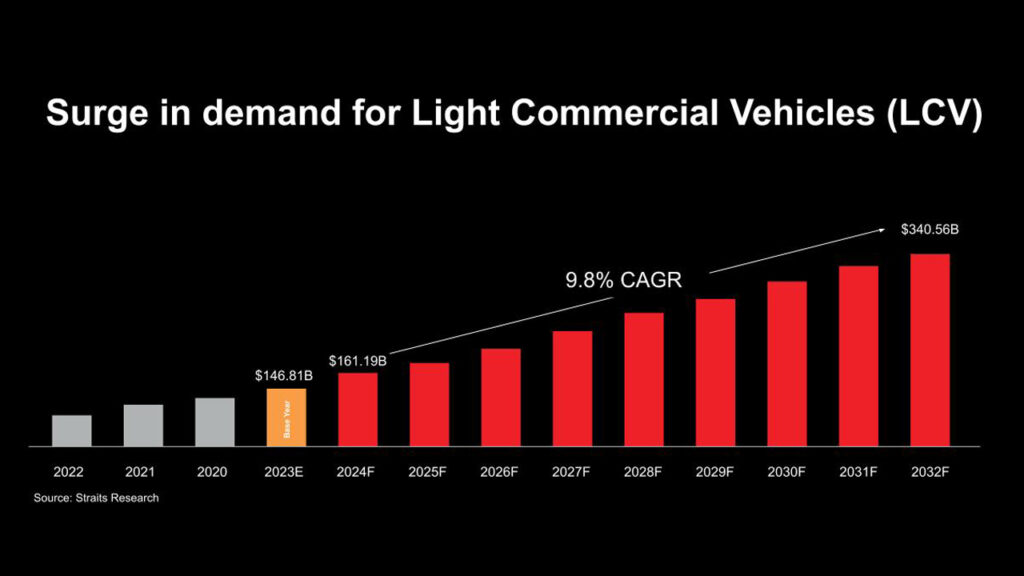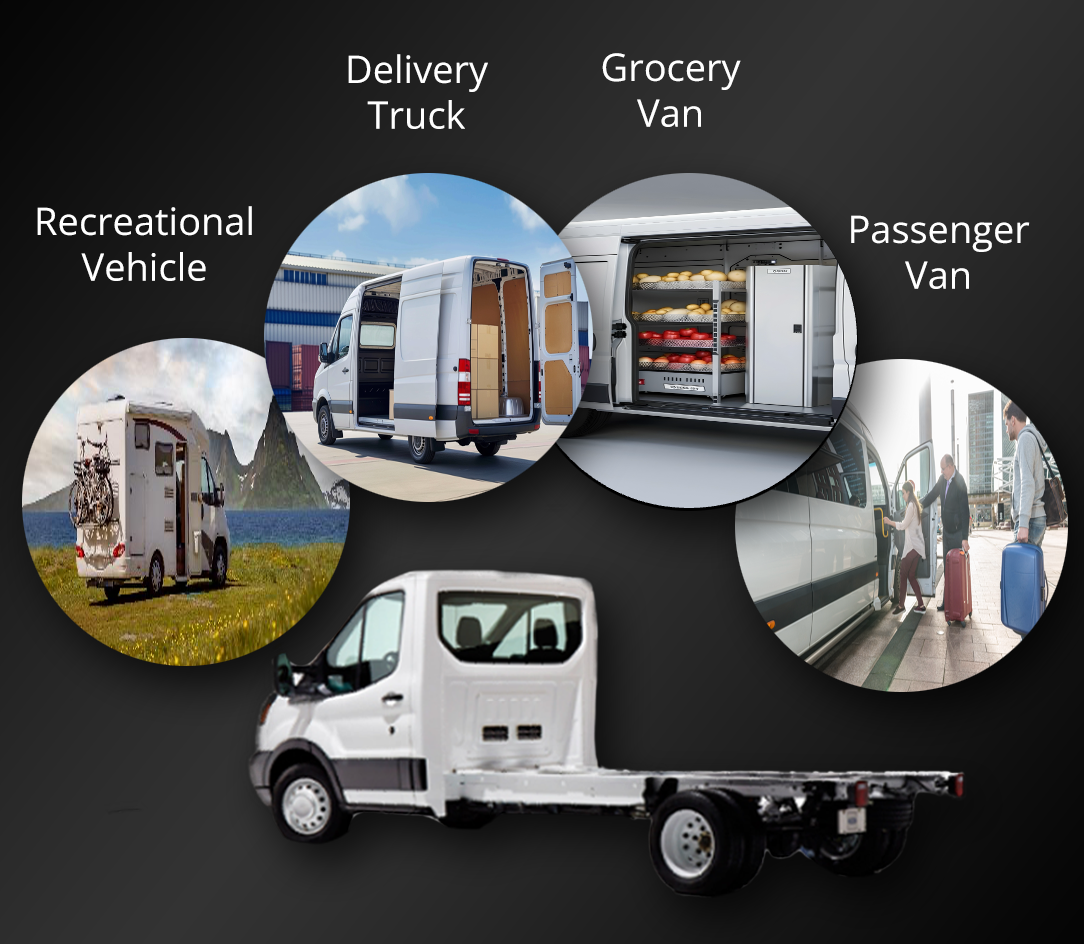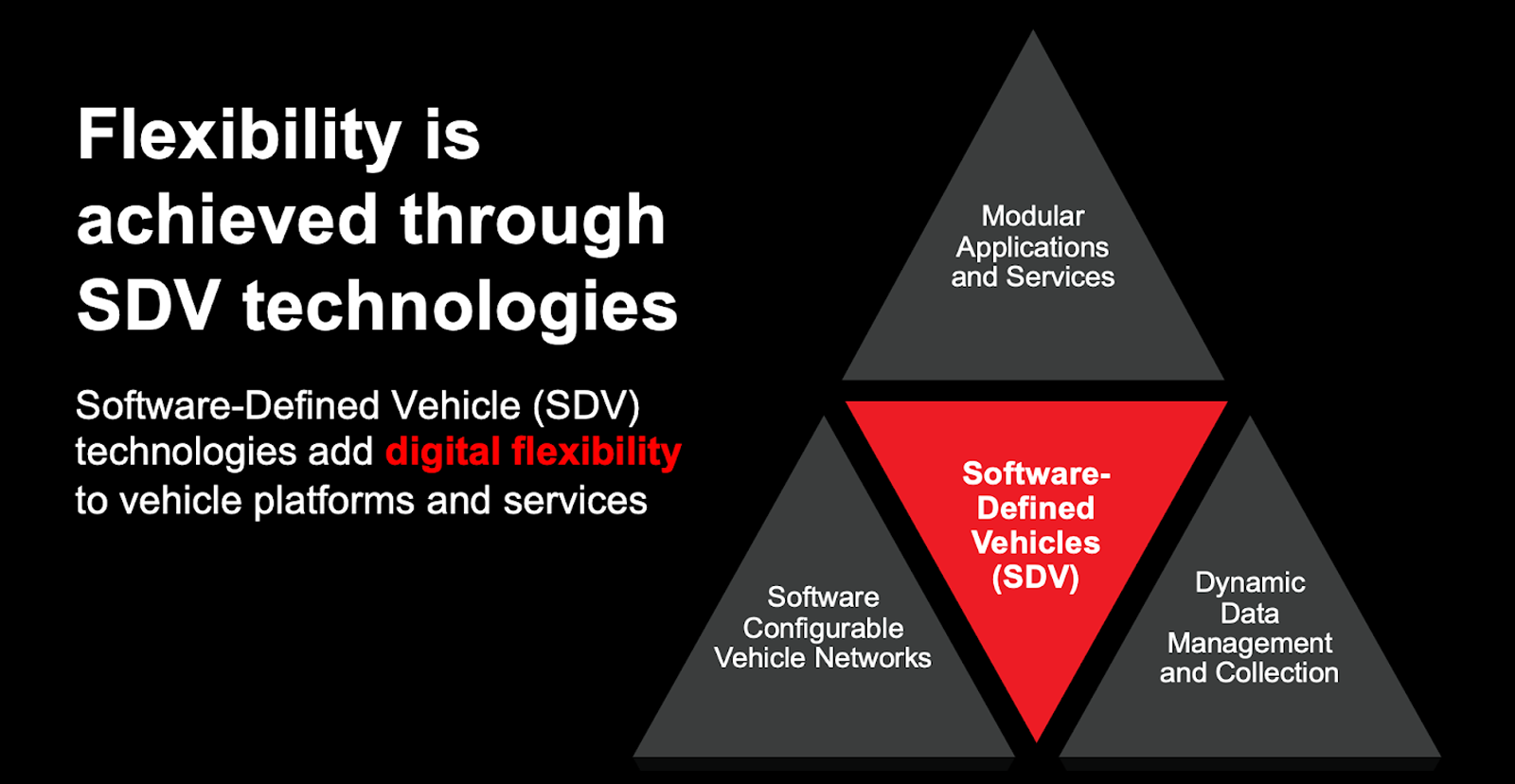The commercial vehicle market is exploding. In particular, the rise of e-commerce and home delivery along with the demand for shared mobility are pushing Light Commercial Vehicles (LCVs) to the forefront. These are the vans, trucks, and shuttles that quietly drive our everyday economy, delivering everything from groceries to parcels to construction supplies. According to the numbers, we’re looking at a market explosion—from $161 billion in 2024 to a massive $341 billion by 2032, with a compound annual growth rate of 9.8%.

This is great news for vehicle manufacturers since commercial vehicle sales have a disproportionate impact on the profitability of auto manufacturers. Case in point: while they make up 25-30% of sales for Ford, GM and Stellantis, LCVs contribute 35-45% to overall gross margin.
But here’s the catch: with that explosion comes a wave of challenges for vehicle makers. Commercial vehicles are no longer just utility machines—they’re expected to be adaptable, smart, and connected in ways that were almost unimaginable a decade ago. Luckily a digitalization strategy built on top of software-defined vehicle (SDV) architectures makes it possible for OEMs to tackle those challenges, described below.
Meeting the needs of diverse customer segments

The days when LCVs could be one-size-fits-all are long gone. The same base model may have many derivatives, each with their unique set of features and functions.
Passenger Vans: Require cabin comfort features, infotainment displays, and interior lighting.
Grocery Vans: Must have accommodate temperature controlled refrigeration units for transporting perishables
Long-haul Trucks: May demand additional Advanced Driver Assistance Systems (ADAS) such as sensors and cameras.
Recreational Vehicles: Need specialized off-road capabilities, including adjustable suspension and dynamic drive modes.
Designing, developing and manufacturing bespoke vehicle lines for each customer segment is inefficient and cost-prohibitive. OEMs must be able to leverage common vehicle platforms to meet the diverse needs.
Delivering tailored post-sales fleet services
The need for diversity doesn’t end at vehicle production and in fact continues post-sales. Fleet customers—think companies managing hundreds or even thousands of vehicles—need more than just vehicles. They need vehicle and driving data, in volume and variety. Telematics, predictive maintenance, driver coaching, and remote management features are now table stakes. But not all fleets are created equal, and their needs vary. Conventional telematics services from commercial vehicles are generally not capable of catering to this wide range of customers.
Integrating aftermarket tech seamlessly with vehicle systems
Vehicle customization doesn’t always happen at the factory. It also happens later, in the aftermarket, when fleet operators upfit their vehicles with specialized equipment—think refrigeration units for grocery vans, lift gates for delivery trucks, and specialized lighting for emergency vehicles. And for OEMs, this is an opportunity to make their vehicles more accommodating of aftermarket upfitting, ensuring such add-ons can seamlessly integrate with native vehicle systems.
How OEMs can capitalize on the LCV opportunities
Despite the challenges, the dynamic LCV market presents a significant opportunity for vehicle manufacturers, provided they can navigate the complexities of serving diverse customer segments. The key lies in designing and building vehicles that are flexible, easily adaptable, and capable of supporting a wide variety of mobility needs and fleet operations.
That flexibility can be achieved by embracing software-defined vehicle architectures; shifting commercial vehicles away from being rigid and hardwired, to being digital platforms that can address many different customer needs.
Sonatus is accelerating the transition to software-defined commercial vehicles
Sonatus is accelerating digital innovation in commercial vehicles. Our products and solutions are targeted at enabling commercial vehicle manufacturers to more quickly and cost-efficiently transition to advanced electrical/electronic (E/E) architectures that support more dynamic and software-configurable capabilities, including in ways described here.
Software-Configurable Vehicle Networks: Sonatus Foundation facilitates the creation of software-defined in-vehicle networks using Automotive Ethernet, that offer a high degree of configurability. Implementing software-defined networks allows OEMs to dynamically add, remove, or change vehicle modules as needed. A useful capability that makes it possible to produce common vehicle platforms that can be used for many varieties of vehicle configurations that are needed to support the proliferating LCV use cases.
Modular Applications and Services: Sonatus Foundation also facilitates the use of modern software development and deployment methodologies, including Service Oriented Architecture (SOA) services and containers, to more easily create and integrate modular cross-domain applications and features. Leveraging this capability, Sonatus Automator provides a software orchestration tool that allows OEMs to rapidly create new and tailored vehicle functions in the form of automated workflows. These no-code workflows can be dynamically deployed to vehicles to deliver everything from vehicle diagnostics for preventative maintenance to driver safety management.
Dynamic Data Management: Access to vehicle-wide signals and data is crucial for fleet management and vehicle performance. A software-defined E/E architecture also makes many parts of the vehicle accessible and observable to achieve data-driven insights and actions. Sonatus Collector, our advanced vehicle data collection product, provides granular, event-driven data collection that can be configured for a variety of use cases, including post-sales fleet services for improving fuel efficiency and predictive maintenance.
The commercial vehicle future is software-defined
The future of commercial vehicles is digital, flexible, and endlessly customizable. Sonatus is the key to unlocking that future for OEMs, allowing them to move away from rigid, pre-configured vehicles to a new era of software-defined platforms for diverse mobility and transportation needs.

Check out all that Sonatus has to offer to enable vehicle manufacturers to get to SDVs faster and at lower costs.
